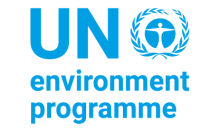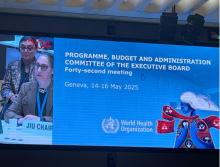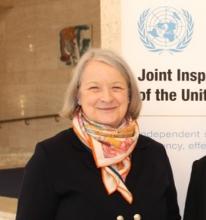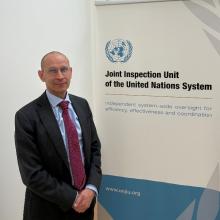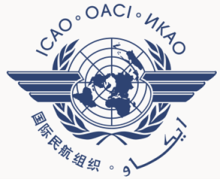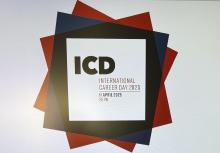News & Events
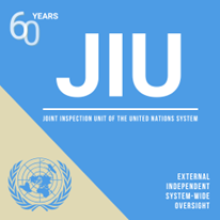
The Joint Inspection Unit and its Participating Organizations
This article is part of a series commemorating the 60th anniversary of the Joint Inspection Unit of the United Nations system highlighting its mandate, evolution and contribution to the United Nations system over the last six decades.
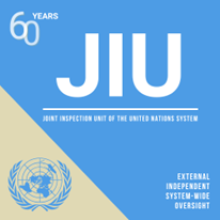
The Origins and Institutionalization of the Joint Inspection Unit
This article is part of a series commemorating the 60th anniversary of the Joint Inspection Unit of the United Nations system highlighting its mandate, evolution and contribution to the United Nations system over the last six decades.
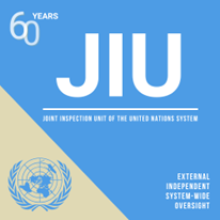
The Joint Inspection Unit celebrates 60 years of External Independent Oversight
This article is part of a series published in the context of the 60th anniversary of the Joint Inspection Unit.
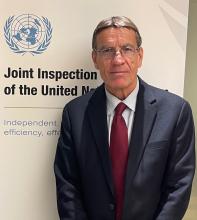
The JIU welcomes Marcel Jullier (Switzerland) as new Inspector
As of 2 January 2026, Inspector Marcel Jullier of Switzerland joined the Joint Inspection Unit (JIU). He brings extensive experience in financial management, audit, oversight and governance across international organizations.
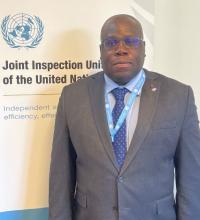
The Joint Inspection Unit (JIU) welcomes Makiese Kinkela Augusto (Angola) as new Inspector, with effect from January 1, 2026
The Joint Inspection Unit (JIU) announces the appointment of Ambassador Makiese Kinkela Augusto as an Inspector, with effect from January 2026
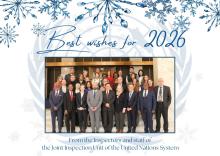
Best wishes from JIU Inspectors and the members of the JIU secretariat
As 2025 draws to a close, the Joint Inspection Unit of the United Nations system extends its warmest greetings and best wishes for a peaceful, healthy, and prosperous New Year 2026.
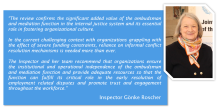

Review of the Health Services in the United Nations system (JIU/REP/2025/6 and JIU/REP/2025/6 (Expanded report))
The Joint Inspection Unit (JIU) is pleased to announce the release of its report “Review of the Health Services in the United Nations system”, prepared by Inspector Victor Moraru.
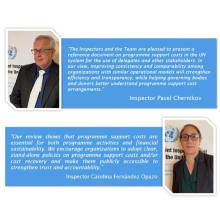
Review of the policies and practices for determining the rates of programme support costs in organizations of the UN system
The Joint Inspection Unit (JIU) has released a new system-wide review on programme support costs (PSC), providing a comparative analysis of how its 28 participating organizations define, structure and apply PSC rates.
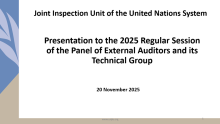
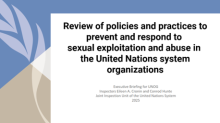
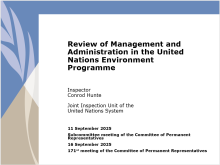
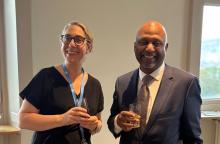
JIU Executive Secretary Uren Pillay Retires After Years of Dedicated Service
On August 28th, the Inspectors and the staff of the JIU gathered in full to bid a warm and emotional farewell to Executive Secretary Uren Pillay, retiring after 25 years in the United Nations.
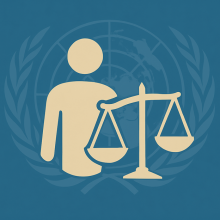
Review of policies and practices to prevent and respond to sexual exploitation and abuse in the United Nations system organizations - JIU/REP/2025/2 and JIU/REP/2025/2(Expanded Report)
The Joint Inspection Unit (JIU) is pleased to announce the release of its report on policies and practices to prevent and respond to sexual exploitation and abuse (SEA) in the United Nations system, prepared by Inspectors Eileen A. Cronin and Conrod Hunte.
